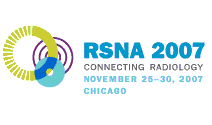
Abstract Archives of the RSNA, 2007
Thomas Josef Vogl MD, Presenter: Nothing to Disclose
Joern Oliver Balzer MD, Abstract Co-Author: Research Consultant, Johnson & Johnson (Cordis Corporation)
Speaker, Johnson & Johnson (Cordis Corporation)
Speaker, Medtronic, Inc
Speaker, Boston Scientific Corporation
Ismail Baysal MD, Abstract Co-Author: Nothing to Disclose
Sebastian Lindemayr, Abstract Co-Author: Nothing to Disclose
To evaluate tumor response with volumetric assessment for tumor sizes after treatment of unresectable lung metastases with transpulmonary chemoembolization (TPCE) in palliative intention.
Between 2001 and 2007 72 patients suffering from 393 unresectable lung metastases were repeatedly treated with TPCE (mean: 3.2 sessions; range, 1-10). The mean age of the patients was 60.1 years (male to female ratio 41/31). They featured a mean of 6 metastases of different origins: colorectal carcinoma (n=28), breast cancer (n=9), renal cellular carcinoma (n=7), thyroideal cancer (n=4), cholangiocellular carcinoma (n=2), leiomyosarcoma (n=3), and others (n=19). Tumor feeding arteries were selectively probed after puncture of the femoral vein; 5 to 10 ml Lipiodol and 5 to 10 mg Mitomycin C and microsphere particles (Spherex) were administered under balloon protection. At 4-week intervals diagnosis and follow-up were accomplished using unenhanced as well as contrast-enhanced computed tomography.
All patients tolerated the repeated treatments without adverse events; neither complications nor influences on labaratory parameters were observed. In 47.2% (n=34) moderate to high Lipiodol uptake was found while 52.8% (n=38) of the treated tumors showed a low storage. In 26.4% (n=19) of embolized metastases, tumor-volume was resolved to 54.1% on average. In 26.4% (n=19) tumor volume remained unchanged and in 47.2% (n=34) volume increased to 144.5% on average. According to the RECIST criteria “partial response” was recorded in 19 cases, “stable disease” in 19 cases and “progressive disease” in 34 cases. Mean survival time was 708.7 days according to the Kaplan-Meyer method.
According to these findings, TPCE might be a well tolerated procedure for the palliative treatment of unresectable lung metastases.
TPCE results in a relevant palliative treatment option in patients with unresectable lung metastases
Vogl, T,
Balzer, J,
Baysal, I,
Lindemayr, S,
Transpulmonary Chemoembolization (TPCE) as a Treatment for Unresectable Lung Metastases. Radiological Society of North America 2007 Scientific Assembly and Annual Meeting, November 25 - November 30, 2007 ,Chicago IL.
http://archive.rsna.org/2007/5004531.html

